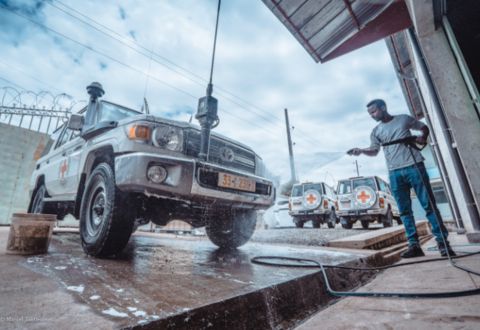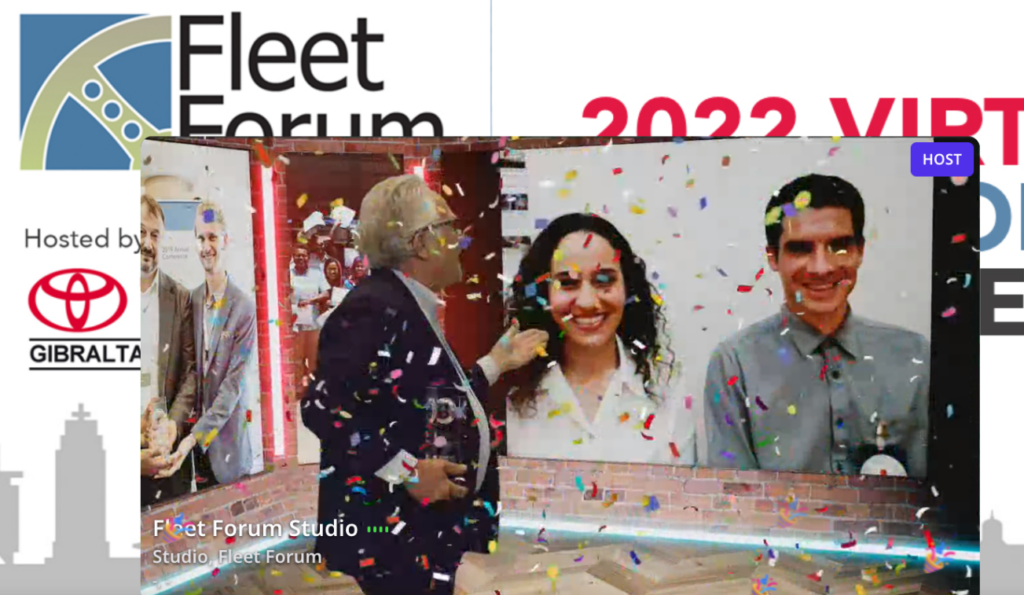The ICRC implemented a comprehensive fleet management policy designed to optimize its fleet’s efficiency and sustainability. This policy encompasses various measures, including the adoption of low-emission vehicles and adherence to rigorous maintenance schedules, which have collectively contributed to substantial reductions in fuel consumption during operational activities.
In parallel, ICRC field teams have long been working on solutions to effectively manage workshop waste. To enhance these efforts, the ICRC and IFRC organized webinars several years ago to identify needs and explore opportunities for improvement.
Read through some of the key activities undertaken to promote a more sustainable and efficient fleet.

Fleet optimization
ICRC has a strong fleet management policy that supports the optimization of its fleet to reduce emissions, which includes a variety of measures such as the use of low-emission vehicles, more efficient use of existing vehicles, reducing dependence on diesel-powered generators, thereby reducing the amount of fuel consumed during operational activities. Currently, 10% of the ICRC Light vehicles comprises environmentally friendly vehicles, including electric and hybrid models, reflecting our dedication to sustainable transportation practices.
Another way to optimize fuel consumption is making sure that “the right car is doing the right job”, so we make sure to use smaller vehicles that consume less fuel, whenever possible. Take a look at the calculation of the total cost of operations per km, the C02 emissions and safety ratings per type of car.
Carpooling systems
The ICRC, in line with its commitment to sustainability and cost-efficiency, is seeking to reduce its environmental footprint through optimizing its fleet resources, including by improving vehicle dispatch planning. To this end, carpooling system requirements were developed in collaboration with the National Red Cross Societies of Colombia and Costa Rica, and with the support of Fleet Forum. Market research was conducted to analyze trends, good practices, and potential service providers, considering existing MRP options.
Multiple discussions and presentations were held with all project stakeholders to evaluate solutions. Each solution was ranked and rated, leading to the development of a business case featuring a scenario-based cost-benefit analysis.
Today, there is a clear business case with return of investment. The best option identified was the internal one that ICRC was already piloting in one country, although the decision for deployment has not been taken yet therefore its global implementation will not happened in 2025 as budget has not been allocated. Please find the final report with the recommended solution.
Waste management
Proper waste management remains a persistent challenge. However, the ICRC is committed to minimizing environmental impact of its workshop waste by refining our activities and developing a monitoring system to enhance waste management within our fleet. To assist vehicle fleet managers in waste management, various supports have been introduced, including:
► Workshop waste management Special Operational Procedure
The ICRC collaborated with the University of Milan to conduct a Life Cycle Assessment (LCA) comparing different options for managing used oil. The study evaluated two recycling pathways: repurposing the oil locally to paint wood shelters as a termite deterrent and transporting it to Kenya for proper recycling. The findings provided critical insights into the environmental and health implications of each approach. These conclusions played a key role in developing the Standard Operating Procedures (SOPs) for used oil management, which were created in collaboration with FleetForum. Their expertise not only enriched the process but also facilitated broader knowledge sharing, enabling other fleet departments to build upon existing best practices rather than starting from scratch, while also allowing ICRC to learn from others’ experiences.
The kit has become compulsory in ICRC workshops. Although not all those Workshops have implemented, full implementation will be in 2025
► Quality, Social and Environmental assessment form for workshop waste managers – available on request.
The Life Cycle Assessment (LCA) revealed that the environmental impact of transporting used oil was minimal compared to leaving it in the country. Furthermore, giving the used oil to the local population to reduce termites in their shelters posed significant long-term risks to both human health and soil health. Consequently, MSF, WFP, and ICRC decided to explore solutions in neighboring countries. Although Kenya initially seemed to be the most viable option, consultations with various ministries and customs authorities confirmed that importing waste into Kenya was not permitted, even with assurances of proper management. Uganda emerged as the second option, and extensive QSE assessments were conducted to evaluate recycling companies and determine the feasibility of exporting the waste. These assessments identified only one company that adhered to the necessary standards to minimize risk and manage the waste responsibly.
In 2023, a successful pilot project was carried out, during which 10,000 liters of used oil from ICRC operations in South Sudan were transported to Uganda for proper recycling. If you would like to learn more about the verification process that led to this pilot, take a look at this example .
To monitor improvements in workshop waste management at ICRC, a dashboard was developed in 2022. FleetWave, the software used by ICRC and many other organizations, was customized by ICRC to include waste tracking. Every time an item, such as a tire, is taken out of stock and added to a job card for work performed in the workshop, it is simultaneously flagged as waste. For example, when one tire is added to a job card, it is automatically recorded as waste once replaced. Although this system is not 100% accurate, it provides a simple and practical way to track waste generation.
Additionally, when waste is handed over to a waste management supplier—validated through a QSE assessment—the details are recorded in the system and reflected in Tableau, the dashboard tool. While the dashboard has been improved since its initial launch, an issue with 2022 data remains unresolved and is planned for review in 2025.
Despite these challenges, current data indicates that more than 50% of ICRC’s workshop critical waste (engine oil, oil filters, tires, and batteries) is being properly managed.
Take a look at this example from South Sudan and how our joint efforts with WFP and MSF resulted in finding solutions for managing our workshop waste.
Training
Through the development of these initiatives, it became evident that working solely with the fleet team would not yield a significant impact. Users, management, and finance teams also play crucial roles in supporting implementation. To address this, and leveraging lessons learned from webinars on sustainable fleet and workshop waste management, a comprehensive sustainable fleet training program was developed for diverse audiences, including fleet teams, logistics staff, administrative personnel, users, and management.
The training is available on the ICRC platform for ICRC users, the IFRC platform for RCRC users, and the Fleet Forum platform for external participants around the world.
ICRC wins the 2022 Best Transport Achievement for their Fleet Safety Project
At the 2022 Virtual Annual Fleet Forum Conference, The International Committee of the Red Cross (ICRC) have been selected the winner of this years’ Best Transport Achievement Award, sponsored by UPS, for their Global Fleet Safety Project. Dimitri Mandin and Farah Maayta, Fleet Safety Program Manager and Coordinator received the award on behalf of ICRC.

